On a recent open adoption advice post, the term “tummy mummy” came up in the comments section.
I admit, there was a day when I would have embraced that phrase as a term of endearment for the then-unknown women who would make me a mom. And I will also say that neither of those women would oppose the use of the term.
But since that day, I have immersed myself in Adoption Culture. Or at least I’ve tried to learn as much about Adoption Culture as a single person can (seeing as how it’s a huge an amorphous thing that a person can pursue but not ever attain). I’ve learned that some don’t like the term — either because it is anatomically inaccurate or it is reductive of the first mom. And I’ve also learned that some adore the term.
This short poll asks your opinion on the term, as well as your position in the adoption constellation (if you have one). Unfortunately, the rudimentary tool I’m using is not capable of determining if there is a correlation between the two.
Please take a moment to chime in, and share this post with your adoption-related communities and friends so we get a decent-sized sample. If you have strong thoughts about “tummy mummy,” please explain in the comment section of this post. This way your opinions will remain available here no matter what happens to the poll site.
As always, please be respectful of others’ opinions, viewpoints and reasoning as you state your own.
~~~
Want to see the poll’s results? Click here!
~~~
This post is part of #MicroblogMondays? Whazzat? A post that’s not too long. Head to Stirrup Queens to join the fun.

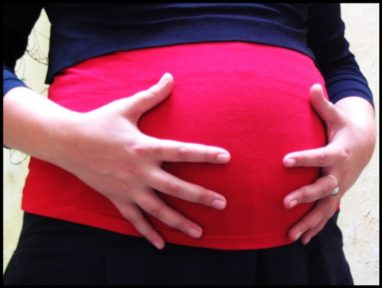
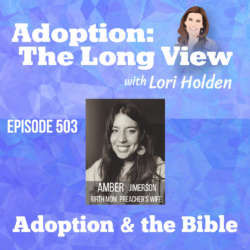
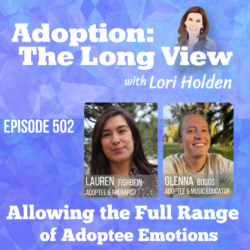
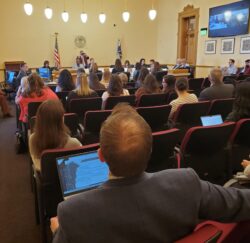
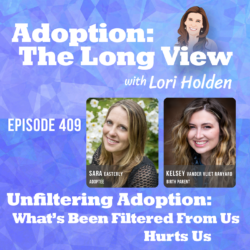

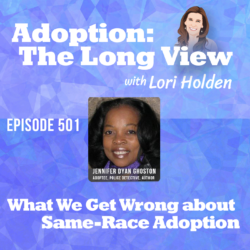

52 Responses
I don’t care for the term because it feels like a white-wash term trying to sanitize truth. I prefer birth mother and/or first mother. Children are capable of hearing/learning/using accurate vocabulary–even at very young ages. There’s no need to teach them misinformation (They did not grow in her tummy, after all.)
If you adopt an infant and tell them immediately (which you should) the concept of first mother implies that another woman mothered you as often she didn’t. I, personally, find that insulting. That’s just me.
“Birth mother” is great.
But every adoptive parent I know tells their two year old “you grew in another woman’s (or name) stomach or tummy” correct or not. It’s something a very young kid can understand.
The whole idea is too make kids comfortable with being adopted and too think of it as natural and “tummy mommy” which is way too cute for me does it.
I could read at 3. I always knew I was adopted. But for some reason my father left a booklet for me to read when I was 5 on how babies are made. TMI. I’m still processing it and can still remember the pictures. (The first part was a joke between my father and me when I was an adult.)
My family used proper words for everything. I’m not sure it’s good when your 3 year old friend has to explain what a “number 2” is.
Thanks for sharing your thoughts, Pia.
I’ve heard some like “first mother” because it honors the mothering that was done from conception until placement.
That TMI from the book your dad left out sounds like a great blog post!
This is the first time I heard the phrase, but I took a dislike to it becasue it reminded me of “yummy mummy”. That’s a phrase which captures the pressure on mums to be skinny, wealthy, good at cooking, whatever the latest pressure is – for me it turned mothering into a bit of a joke. So that’s my prejudice against the new phrase. It could take something very complex and denigrate it. But I suppose if “tummy mummy” was being used sensitively and with love to explain a difficult concept to an adopted child I could see its beauty.
I don’t like the term, and never have although I think it has more to do with my personality than anything else. I’m the type who tends not to use any kind of pet name and have a limited baby talk vocabulary. That being said, I don’t think it’s horrible, especially if used at specific ages, like preschool and younger. I wouldn’t use it when the child is older though.
I usually have a problem with cute terms and nicknames; especially when attached to an emotional situation. Maybe I’m just not a cute person. I like my made up terms to fill a gap where there is no existing term.
But this is the first time I’ve heard tummy mummy.
I totally agree with Jen that my first association with the term was the “yummy mummy” thing as well, and like her, it’s not a positive association.
I think it’s a little too twee in general what with all the emotions/etc. that go into an adoption. But I acknowledge that other people may feel differently, and if it’s what works for that particular situation it’s what works.
Thinking of all the first mothers I know (and the one I don’t know, my daughter’s original mother) and I can’t think of a single woman who would appreciate being known as “tummy mummy”.
My objections are threefold:
1. It diminishes the woman’s motherhood. Like it or not, she is a mother, period, not just one in the tummy (see how ridiculous this sounds when you run with it).
2. It implies that the other woman carried the child for the adoptive parents. This is untrue unless it’s a surrogacy situation. Of course, prebirth matching may encourage this view (witness people talking about “our birthmother”), but this only exposes the manipulation inherent in prebirth matching. A woman’s child is her child until she makes the decision to surrender and even then, she is still a mother.
3. It could be potentially confusing to the adopted child’s understanding of his or her other family, heritage, siblings, and so forth. What is the important thing, that he grew in someone’s tummy or that he is genetically connected to the other family? How is this phrase actually used? “You grew in her tummy but we’re your parents”? Original family isn’t reflected in this phrase, which seems intent on removing all important connections and substituting them with a biological detail that isn’t even accurate. Who needs a phrase like this, anyway?
Heck, they used to claim that kids with two parents of the same sex would be totally confused as well, and it simply isn’t the case. Confusion tends to be tossed around when people don’t like the paradigm shift. In the phrase “tummy mummy” I can’t help but hear the adoptive parent hanging onto her status as real. No need to do that. Everyone is real, even when we’re absent or not perfect (which is all of us).
Thanks for helping prompt this discussion, Jess. It was of note to me that in the comment section on the post that this term arose (https://lavenderluz.com/2015/07/when-to-tell-child-they-are-adopted.html), it was an adoptee advocating FOR “tummy mummy” and an adoptive parent arguing AGAINST it.
Hey, I was consciousness-raised years ago.
I understand how it could be demeaning. But, I can also see how it could be a useful phrase for explaining things to children
I’m an adoptive parent. I don’t love this term either(haven’t used it) but am concerned that sometimes we as a community over-police our language. I’d much rather an adoptive parent use the term to explain adoption to very young children than to wait to talk about adoption until the children are older. And I’m kind of tired of watching new APs getting read the riot act because they’re using a term that (admittedly only part of) the adoption community disagrees with. What is important is that communication and learning is happening. On the long list of ways we should reform the adoption experience, this particular issue is not on the top. Still, happy to see you’re checking in with the community to understand the feelings around it.
Good points, both about over-policing and about blasting people as a first step in a conversation. Makes communication quite difficult after that.
I hate “tummy mommy.” When people told me babies grew in their moms’ tummies, I pictured babies swimming their stomachs with all the food. And babies popping out of tummies, Aliens-style. Yeah. Not good.
We do use the term “uterus”, actually, for describing pregnancy. And we use “birthmother” or “birthmom” for my children’s biological mothers.
I have to share a funny story from my five year old. She always known she was adopted and we explained it in very similar ways most AP do. Well recently we start to use more “correct” terms thank mostly to an adoption book I liked and picked up a few years ago which talks about a women’s uterus rather than her tummy or stomach. Well the other night my husband was putting her to bed and she said “dad I have a tiny uterus”. Lol. So funny. Anyway wanted to share that there can be unexpected consequences for using correct anatomy with kids too. I shudder to think what my daughter is teaching the neighbor kids. If you going to use “correct” terms understand they will know term their peers do not. As for tummy mommy, I’m mostly neutral, I don’t care for it and don’t use it but have no feelings if other choose to, it’s just a personal preference for me.
That’s a great story Beth. And a cautionary tale 😉
I’m a prospective adoptive parent. I don’t hate it, but I don’t like it, either. It sounds a little too cutesy, a little too flip to describe such an important role. But then again, I know when you are explaining things to smaller children words can get cutesy and rhyming, but it’s usually to mask something that makes adults feel uncomfortable (like pee-pee instead of penis). I kind of like to call it as it is, and birth mother or first mother sound right to me. And I bet a very young child could understand that.
“I bet a very young child could understand that.”
I think so too, Jess Prospect Adoptive Parent.
Small children associate the word “tummy” with digestion. As far as they are concerned, it’s where food goes after it’s eaten. If they eat too much, or eat something that is not good, they get a “tummy ache”. That alone could be cause for confusion. I speak from experience, having been flummoxed by this when I was a child.
There’s nothing wrong, and indeed, IMO, everything right, about explaining to young children that women have a special place inside them in which babies may grow until it is time for them to come out into the world. There is no need for parents use the correct anatomical term early on if they feel uncertain about it.
Other Jess makes good points too, especially about how “tummy mummy” is demeaning to the natural mother, and how it does not reflect anything to do with the original family.
OTOH, I don’t have a hate-on for people who use the term ignorantly, but with good intentions. I just hope they learn better.
I concur that we can do without the word police. I also think language is important because it conveys emotions as well as facts. My intent is to help educate people, not to chastise them. As Maya Angelou famously said, “AS people know better, they do better.”That’s why these discussions have value. When we share perspectives, we create understanding and help make adoption conversations more respective for all members of the triad.
I also do not mind when people use terms with good intentions. But generally, I follow the rule of calling people what they like to be called, not what it suits me to call them. If that’s “policing,” it’s news to me.
I don’t think that’s “policing” either. I call it courtesy.
Correction: When we share perspectives, we create understanding and help make adoption conversations more respect-FULL for all members of the triad.
I don’t love the title, for many of the reasons already outlined here more eloquently than I could do. We say “first mother” here, although I should note that I was once read the riot act by someone who informed me that “birthmother” is the correct term, so I guess you can’t please everyone.
I also agree that language policing isn’t helpful. Discussions like this one are, though. Understanding the meanings behind the things we say – implied or inferred – is far better than avoiding certain words and phrases just to be politically correct, IMHO.
This is so true: “you can’t please everyone.” And why, once we hear about how words strike others and why they strike in certain way, we all must do what works for us (hopefully taking into account what we’ve learned from others).
Generally, it seems like terms that rhyme have a lot of staying power, regardless of context.
They also tend to border on overly cutesy wootsy. 😛
I don’t love it but can see how it could be useful. My son’s birth mom wants to be called Auntie. He has lots of friends who are Auntie and I have no sisters. This may lead to confusion too. But like tummy mommy or birth mom, we’ll have to discuss the meaning of the term. I don’t like the language police because it’s inherently condescending. Offering other possibilities and points of view is great. I learn from that. Assuming that there is one right or best way says “I know what’s best and you don’t.” What’s best and right depends on many factors.
I hadn’t thought of that point, that “auntie” is also sometimes used in an imprecise way. And kids figure it out.
I can’t imagine calling my (long gone**) bmother a “tummy mummy”, it makes her sound like she was a surrogate rather than a human being making a difficult decision. It reduces her down to a particular “role”.
To be honest, I don’t particularly like “birthmother” either because again it reduces her down to a role. However, I realise that online one has to use something and one another forum years ago, it was decided that “birthmother/birthmom” were the only terms that didn’t offend the adoptive parents on that site so everyone more or less just had to use the above term.
IRL I tend to just say her name, it makes things easier.
It can also depend who is using the titles. It doesn’t bother me if most people use “birthmother”, “mother”, “natural mother” etc (btw my mum uses “natural mother” (that was the phrase at the time). However, when it comes to my biological family, talking about her to me, they mostly use her name or say “your mother” and that is what I like from them. I would feel odd if they called her “Your birthmother”. I think it has to do with the fact that they are my uncles, aunts, cousins etc and I am their niece/cousin – no prefixes required – so to then use a prefix would make me feel as if I was “more distant”. When my eldest female cousin talks about her, she says “Auntie P” and I really like that because it does make me feel that cousin connection.
**My bmother died over 35 years ago.
(btw I’ve just noticed that I’ve overused the word “her” in order to avoid having to use a term).
Your thoughts on titles and names makes me realize that for all the energy we put into arguing terms, the adoptee eventually decides what works for him/her.
cb, did you have a chance to meet your natural mother? I’m sorry that she died when you were so young (I’m assuming you were young).
She died when I was 16 I was born in the 60s). I didn’t meet my extending bfamily until 5 years ago (uncles/cousins). She never had another living child (twins that died at birth). By all accounts, she was a lovely lady.
As an adoptive parent, I’m not fond of that term and have never used it. I think I prefer birthmother and (everyone with involved in the process used that term) probably because we were matched before birth. I’m not sure my son’s birthmother refers to herself as such, but she also calls me his mother.
I am an adoptive mother and my husband is a reunited adult adoptee. I actually shared this with him and he made a vomiting noise, FWIW.
Personally, I find it very dismissive of the birth mother and her contribution to and role in an adopted child’s life. It completely negates the reality of genetic heritage and the role that DNA plays in shaping personality and so many other traits. That connection literally lives on for the child’s entire life. “Tummy mummy” just encourages the thinking that being a birth mother is a one dimensional act.
I also think using this term, “tummy mummy” is actually more confusing to the child than simply taking the time to explain at their level what adoption is and isn’t.
An adopted child has two sets of parents. It’s that simple. One set that they inherit their very being from, and one set that raises them and shapes those traits. As adoptive parents, we have to get comfortable with that reality for our children’s sake and I don’t feel that using cutesy terms like “tummy mummy” really helps to accomplish that.
Your point about the genetic connection makes me think of other situations in which the gestation and the genetics are separated through surrogacy or donor gametes.
Like so many things in adoption, there is more depth to this issue than I suspected.
I appreciate this conversation. I find in many adoption groups, people try to convince each other about a term or police what’s right or best and what’s wrong. I’ve seen people get “reprimanded” for using certain terms that have one meaning for the speaker and a different one for the listener (who feels strongly that their terms fit everyone’s situations). I really think all of this is contextual and depends on the norms in the relationship. I imagine when my son is a bit older, he might understand “tummy mommy” if he’s around women who are pregnant. But as he grows older, perhaps “birth mom” will make sense. I saw someone in a group lash out about Auntie if the person isn’t an aunt but that doesn’t fit for me. At some point, his birth mom and I will have to talk and figure out what’s best for my son and her son who she’s raising that knows that “my” son is his brother. A bit complicated but I’m glad to wrestle with it. It’s happening because so many people who love him are in his life and we all want him and his (broadly defined) family to be healthy and whole.
I think you’ve touched on something with your last sentence: “so many people who love him are in his life and we all want him and his (broadly defined) family to be healthy and whole.”
This is the commonality among us. We all care for the child at the center and seek for that person health and wholeness. If we grant each other that, maybe we are also able to suspend judgment.
While “tummy mommy” is certainly not my preferred term to use, I do think there is a time and place for this term to be used. I have used it with my preschool aged children to help them gain a better understanding of why their birth mom is their mom. My children had multiple placements and thus multiple “mommies,” so this was one way to help explain why not all women are their “mommy”. At the time, my children also saw someone close to us pregnant, so they could physically see a growing tummy. I certainly did not use the term as a means to diminish the role of their birth mom, but I think it did help my children gain a better understanding of one of the roles their birth mom has played in their lives.
Yet another perspective I hadn’t thought of: kids who’ve had several mother figures, and how to help them understand the difference between “woman” and “mother” given their experiences, and the special role of the woman who birthed them. Thanks, Jennifer.
I would hope for honest thought about the questions asked in consideration of the children involved. It IS about the children after all. Did those children experience the ”role of the other women” in their lives as a mother? If they called them mom or were mothered by them, they were ‘mother/mom’ as far as the children were concerned.
My second mom tried to call my real mother my “birth mother” once… No, I will not permit that. That is dismissing what she is to me, and what of me she made. My mother died when I was young. The child or adult son or daughter ought to have the right to determine what -they- want to call their mother’s. It diminishes my mother by saying she is my “birth” mother. Both mothers provided for my life. They are both called Mom.
Jennifer, Do you/did you ‘correct’ your children if they called a previous (what? foster?) mother in their lives by saying she was ”just a woman who took care of you, she was not your mother”? Can you begin to imagine the mental confusion? The possibly feeling “punished / bad” for calling another woman mom or mother? or the thoughts of “I didn’t have a ‘mother’ for (fill in the blank) months/years. Why can’t every mother who provides love, time, effort, attention and the necessities of life be called ‘mother/mom’? Is the need to claim the title of Mother so important that we are willing to leave children ‘motherless’ (without a woman to call mother) unless and until the birth certificate is ‘forever after’ / ‘permanently’ altered in a court?
Lori you said, “..how to help them understand the difference between “woman” and “mother”…..”role of the woman who birthed them.” ? The way you phrased that, it **sounds** awful . Ouch! times ten!
One more thought, ***If*** opposites apply and natural mother ‘means’ unnatural mother, true / real mother ‘means’ false /fake mother and first mother ‘means’ (to some) second place or second best mother, and tummy mummy is ‘only a ‘mummy’ till you were born, doesn’t birth mother ‘mean’ death mother? When it’s put in that light these opposites sound rather preposterous. To me.
I love the term. We will use it when explaining to our young daughters about their story as we loving tell them they grew in our hearts and birth mom’s tummy. When they get older we can explain it more correctly. First mom sounds really offensive to me, like I would be taking second place.
Hi, Jess. I wrote once long ago about how I’d used “first” as an ordinal term when I really meant it as a chronological term: https://lavenderluz.com/2007/06/in-adoption-last-means-best-2.html
Although the post had to do with adoption as my second choice for building a family, it also led to a shift in thinking about the term “first mother.” It makes me as the second or last mother a factual thing, not a judgment thing.
I think it is good for small children.
I have often wondered if my mother who gave birth to me had been still alive when I searched for her, what would she have wanted me to call her. My three much older siblings that she raised didn’t seem to have a problem with me calling her, my mother, too. It’s hard to imagine that our mother passed away prematurely over 53 years ago. Would her mindset have been different than those who are adamant now that the term “birth mother” is wrong and demeaning? Personally, I believe because my mother and I are supposed to be a lot alike that she would have been hard on herself and said that raising a child makes one a mother. In my particular circumstances, that would have been difficult to hear/accept because I needed a mother. My adoptive mother never called her birth or natural mother. It was almost as if I came from an immaculate conception because mom made it clear I wasn’t her child, but I wasn’t anybody else’s either. Having worked with young children for many years, I believe using the proper words is best for almost any subject matter. I’ve heard so many different terms used for private spots that I could start a new dictionary. In my opinion, young children are not given enough credit for understanding that we can have two mothers that love us, regardless if one can’t be there at the moment. I know for me personally it would have helped me tremendously to have been able to see and talk freely about my mother as this real person.
JoAnne, your words: “In my opinion, young children are not given enough credit for understanding that we can have two mothers that love us, regardless if one can’t be there at the moment. I know for me personally it would have helped me tremendously to have been able to see and talk freely about my mother as this real person.” Such honest commentary that has such instructive relevance for those who parent via adoption. I believe this both/and approach is far healthier for ALL parties. Thanks for sharing
This makes me sad, bordering on mad.
“It was almost as if I came from an immaculate conception because mom made it clear I wasn’t her child, but I wasn’t anybody else’s either.”
So glad you’ve ended up building a life in which you’re surrounded by love.
Don’t care for it. Feel the attempted endearment seems forceful on a young mind. Use clinical/accepted terms, and let the adoptee define the relationship from there.
I wouldn’t use the term because it’s just “not me,” but I don’t have any significant objection to it. I don’t like “natural mother” because it just sounds odd to me. I don’t like “first mother” because to me it sounds like somehow she stopped being their mother when I came along. We use — and have always used — birth mom/birth mother when there is a need to distinguish. We also sometimes just use “mom” — my kids have never been confused.
I think the term ‘tummy mummy’ is awful and disrespectful.
Whenever I hear it used, these thoughts cross my mind:
1. The person using this term wants to diminish the enormity of what has happened: that a mother has lost her child, and a child has lost his/her mother. That both have been separated from each other is an enormously significant and painful thing to have happened to each of them. Using infantilising, fairytale-like language and giddy positivity seems like an attempt to diminish the utter and undeniable seriousness of this fact and thus is deeply inappropriate, in my opinion.
2. The person using this term wants to erase the existence of the family of origin. Using terms like ‘tummy mummy’ is an attempt to diminish them, and particularly the mother, to near irrelevance – their role being reduced to a small physical act for a limited duration. The opposite of tummy mummy is ancestry.
I think it comes down to what you would prefer to be called under similar circumstances. I, for one, wouldn’t appreciate being called a “tummy mummy”.
My APs always used the term “biological mother”. Frankly, I always thought that made her sound like a 7th grade chemistry project, and it was distancing. There was never any talk about my “biological father”. As I look back now, I wonder why he was completely left out of the conversation? Probably because my APs were uncomfortable explaining the basics of sexual reproduction.
When a neighbor became obviously pregnant, my then pre-school-aged children wanted to know if she had eaten a baby. How else could it have gotten in her tummy, right? I explained to them that the daddy had put the baby in her tummy. And when they asked me how the baby would get out. I simply explained that it would come out the same way it went in. And they wanted to know WHERE it would come out. I told them it would come out in the hospital. Sometimes a bit of obfuscation is called for. Therefore, I think “tummy mommy” could be useful for speaking generally to very young children. But to be respectful, that term will have to be updated as the adoptee matures.
What do you call a biological father? Tummy daddy? Vag dad?
Tummy Mummy makes me think of Teletubbies, so… No. Anyway, I’ve always hated the term tummy in any context. We used specific language from an early age. Both my children still tease me about it and the one who is a parent favors euphemisms with her own daughter.
I do remember when my first daughter was four and we had just adopted her sister, who was almost 2. I was explaining that they both were born to the same mother, that they both grew in a special place in her belly. The older one gave a long look at her tall, constantly active new sister and said, “that’s a lot of girls in one belly.”
I love the term Tummy Mommy! The adoptive parents Chose it. And I felt like it was Something more personable than birth mother.
I adopted my cousins baby when she was only 9 months old and at the time I was also pregnant with my son. As my adopted daughter grew up she would always ask if I nursed her like my I did with my son and how big I was in her tummy. I told her that she had a different “Tummy Mummy”. This was before I had ever heard the term and just made it up at that time. I tried explaining that she had a different mother because she was adopted many times and in different ways, but this was the only way that actually made sense to her since she was so young. I think the term can and should be use in certain circumstances.